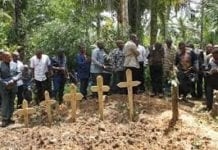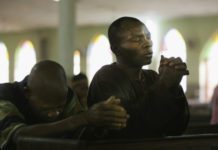By BosNewsLife Middle East Service

CAIRO, EGYPT (BosNewsLife)– The re-opening of churches that had been closed under ousted Egyptian President Hosni Mubarak is overshadowed by violence, according to rights activists.
In one of the latest incidents Thursday, May 19, a Muslim mob tried to block Christians approaching the Church of the Virgin in the Cairo neighborhood of Ain Shams, advocacy group Middle East Concern (MEC) told BosNewsLife.
“The two groups threw stones at each other [but] police quickly restored order and made some arrests. The Christians then approached the church via a back route,” MEC said in a statement.No injuries were reported.
News of the violence came amid reports that Egyptian prosecutors have started proceedings against 23 members of the ultraconservative Salafi sect of Islam which have been linked to violence that killed more than a dozen people earlier this month.
The suspects have been charged with terrorism, premeditated murder, vandalism of public and private property, and intimidating citizens, said MEC, which closely monitored the procedures.
TORCHING CHURCH
Salafi allegedly inspired mobs to torch Virgin Mary Church in the Cairo neighborhood of Imbaba following allegations that a Christian woman planned to marry a Muslim, which some religious purists consider to be forbidden.
Nearby, rioters tried to storm the Mar Mina Church, but were halted by Christians who formed a human shield around the church and fought for hours, witnesses said. Fifteen people were reportedly killed and more than 200 injured in the riots.
Despite the tensions, Egypt’s military backed government approved 16 churches for re-opening, of which at least three have already been opened, according to MEC investigators.
More re-openings are expected next week if authorities are satisfied that adequate security measures are in place. Fear of sectarian clashes was one factor in the original decisions to close the buildings, MEC said.
FEELING INSECURE
Christians, who make up about 10 percent of Egypt’s population, say they feel increasingly insecure since 18 days of street protests brought down Mubarak, who led the country for nearly three decades until he was forced to resign on February 11 following massive protests.
In remarks published by MEC, Egyptian Christians urged fellow believers around the world to pray for a “peaceful” reopening of churches, that “the bereaved will know the comfort of Jesus” and that “the wounded and traumatized will know the healing touch of Jesus.”
Several weeks before the attacks on the churches, Egyptians led by hard-line Islamists repeatedly rallied and marched to protest the appointment of a Coptic Christian governor in the southern Egyptian province of Qena.
And, last weekend, violence against a sit-in of mainly Christian demonstrators demanding more rights in Cairo erupted when a mob of over 100 people threw rocks and firebombs and attacked dozens of people sleeping in the area, witnesses said. Some 15 vehicles were also set on fire and damaged, according to news reporters.
While Muslims and Christians, also known as Copts in Egypt, demonstrated together against Mubarak’s rule, church leaders have expressed concerns that more hard-line Muslim leaders will replace his regime or at least have a prominent voice in a new government to be formed after scheduled elections later this year.









NO surprise, since it is illegal under Sharia law for non-Muslim places of worship to be repaired or built.
It all goes back to the ‘Pact of Umar’ in the 7th or 8th century. (Wikipedia has a page on the Pact Of Umar.)
Indeed Mohamet was a prophet of Satan